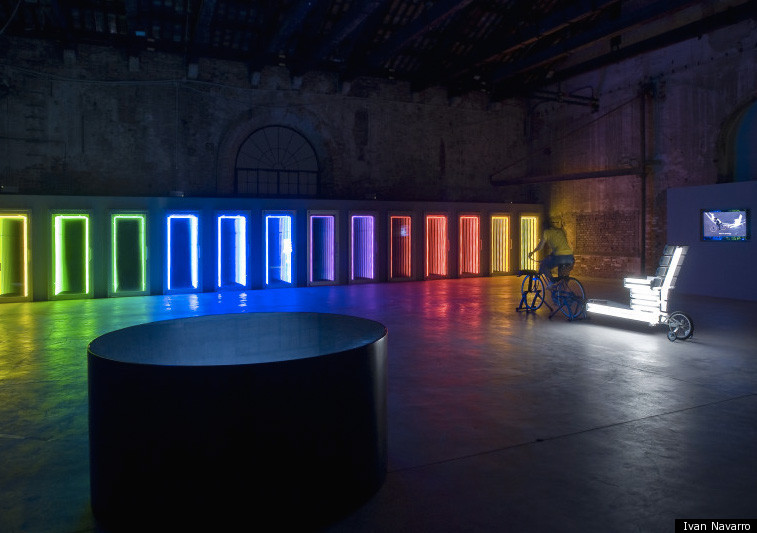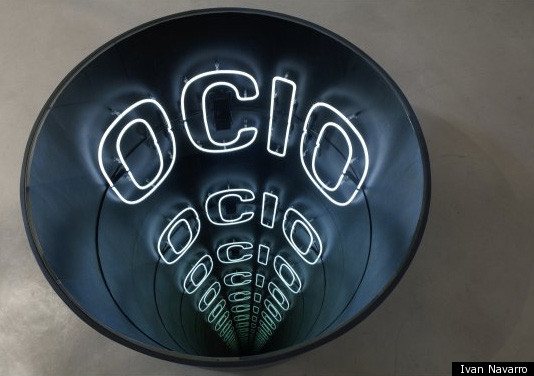During Ivan Navarro's childhood in Santiago, Chile, power outages were used as political threats. Because of this history, light plays a complicated role in his pieces: it is power, truth, and hope; it is also danger -- it electrocutes.
The light fixtures contain complex references to art history and politics yet stand alone as stunning neon visions. The artist works with language with unprecedented attention and care, sculpting meanings from the shape of words and shapes from the meaning of words. His pieces are poetic and political, ripe with references yet maintaining the ability to stand alone. And yet, our interest was piqued, so we asked Ivan a few questions about his work:

HuffPost Arts: Was there an a-ha moment when you decided you wanted to work with light as a medium in this way? Did you first experiment with other media?
Ivan Navarro: I was in art school (I graduated in 1995) experimenting with photography. I was obsessed with watching and following albino people on the streets because of their intolerance to light. That was the first time I thought of light as a very powerful material to work with.
HuffPost Arts: Your work is enmeshed in both politics and poetry, two fields which are arguably polar opposites. (Politics as real-world, poetry as fantasy...) Do you think this is a valid distinction? How do the two relate to each other in your works?
Ivan Navarro: I don't see it as a valid distinction. Politics usually take place in a very complicated social zone, they deal with subjectivity as an objective subject and especially with people's behavior which is very organic and hard to control. Poetry is the same, we can interpret words however we want. That's why to play with politics and poetry in art isn't not so strange.

HuffPost Arts: You have a beautiful quotation in Art News: "The word is only completed in its representation," in regards to physically symmetrical words such as BED, HIDE, ECHO. As a Chilean artist who deals so intimately with language, how do you deal with translation? Do the shapes of words take such poetic, meaningful shapes across languages?
Ivan Navarro: Sometimes they do, sometimes they don't. Usually a word's double meaning is only interesting to me in one language, like DEGENERATE -- a word that I am working with now. If I think of its Spanish meaning or connotations when I translate it in my mind, the word loses the richness it has in English. Other times the translation helps or adds more meanings to the piece, like DETOUR, which is same word in English and in French, but the translation into Spanish -- DESVIO -- is even more interesting. Another difference that occurs in Spanish and English is when you translate a word that can be both a verb and a noun at the same time, it doesn't necessarily keep that quality in the other language. So, that's why the reflection of the other half of the word in the mirror works as the perfect metaphor for how the meaning of a word lives in a very subjective zone.
HuffPost Arts: Do you differentiate between natural and electric light in terms of psychological effect (or poetic meaning?) Would your works communicate a different meaning with 'real' as opposed to artificial light?
Ivan Navarro: I don't really work with natural light. I always need artificial light to be the only source of illumination for an exhibition, to the extent that most of the times the pieces are the only illumination of the show.
HuffPost Arts: Is there a work of art that you return to for inspiration?
Ivan Navarro: Most of the times it is music. I have a large collection of records and started my own record label (HUESO-RECORDS) where I find much of my inspiration to create.
